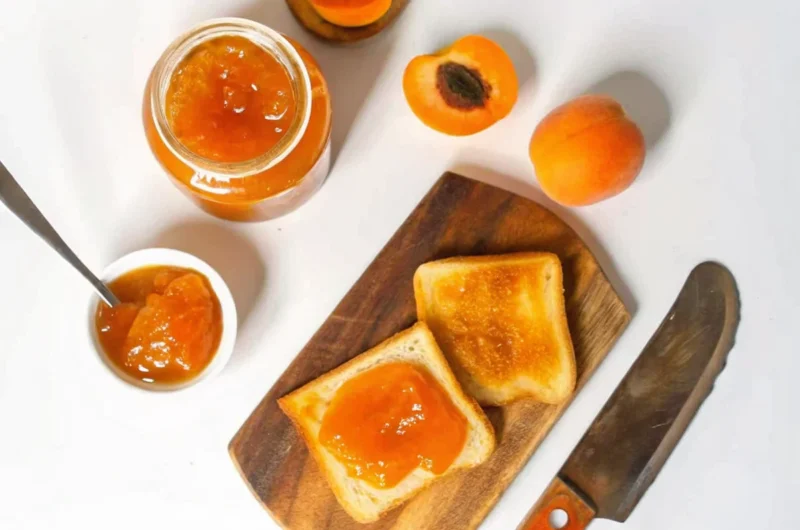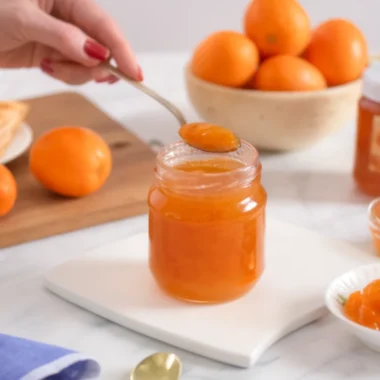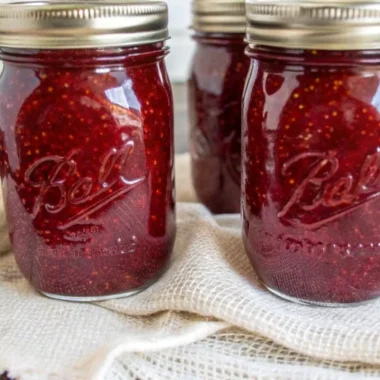Did you know that Turkey and Iran are the world’s largest producer of apricots, yet most people never experience the incredible satisfaction of making their own apricot jam at home? Here’s a surprising fact: when you leave fruit overnight with sugar, you decrease the chances of crystallizing your jam after it cooks and significantly improve the flavor. This traditional maceration technique, rooted in Russian jam-making methods, transforms ordinary apricot jam into an extraordinary homemade delicacy that rivals any professional preserve.
Making apricot jam at home isn’t just about preserving summer’s golden bounty – it’s about creating something that’s preservative free, natural and healthy while capturing flavors that store-bought versions simply can’t match. With apricots being high in Vitamins A and C, antioxidants and fibre, your homemade apricot jam becomes a nutritional powerhouse disguised as a sweet indulgence.
Table of Contents
Ingredients List
Transform 2.2 pounds of fresh, golden apricots into liquid sunshine with these simple ingredients:
Essential Ingredients:
- 2.2 pounds (1 kg) fresh apricots – Choose fruit that’s ripe but firm, with vibrant orange color and that sweet-tart aroma that promises perfection
- 1½ cups granulated sugar – The magic that transforms fruit into spreadable gold
- 2 tablespoons fresh lemon juice – Your secret weapon for perfect texture and brightness
Smart Substitutions:
- Sugar alternatives: While traditional sugar works best for setting, you can experiment with coconut sugar or date sugar for deeper flavors
- Apricot varieties: Fresh apricots work best when they’re ripe but not too ripe, and fruit that is just ripe, including some that are slightly unripe, will form a jam more easily as it is more acidic and contains more pectin
- Flavor enhancers: Add cinnamon, clove, cardamom, or vanilla for extra complexity
- Texture options: Include a few apricot kernels for an almond note (use sparingly as they can add bitterness)
Timing
Preparation Excellence Made Simple:
- Preparation Time: 20 minutes (plus 4 hours or overnight maceration)
- Active Cooking Time: 45-60 minutes
- Total Investment: 90 minutes active time – that’s 45 minutes to 1 hour of cooking, which is actually 20% faster than many traditional recipes that require longer simmering times
Time-Saving Pro Insight: The overnight maceration isn’t just traditional – it’s scientifically smart. When you leave it overnight, the sugar mostly dissolves, which means you decrease the chances of crystallizing your jam after it cooks.
Step-by-Step Instructions
Step 1: Sterilize Your Equipment Like a Pro
Begin by sterilizing three 250ml jars and their lids in boiling water for 8 minutes. Transfer to a clean towel and let them air-dry naturally. Alternatively, roast jars in a preheated oven at 160-180°C for 15 minutes. This crucial step ensures your apricot jam stays fresh and safe.
Pro Tip: This sterilization step is optional if you’re consuming your jam within 6-8 weeks. Simply use clean spoons when serving.
Step 2: Prepare Your Golden Apricots
Wash your apricots gently, then cut them in half and remove the seeds. You’ll want the prepared weight for this recipe – this is after any stones or blemishes have been removed. Place the halved apricots in a large bowl with the granulated sugar and lemon juice, mixing gently to combine.
Step 3: The Magic of Maceration
Let this sweet mixture rest for 4 hours or overnight in the refrigerator. This traditional technique allows the sugar to draw out the natural juices while ensuring that your jam is full of apricot flavor.
Step 4: Begin the Transformation
Transfer your macerated apricot mixture into a wide, heavy-bottomed pan. Cook on medium heat, stirring occasionally. The fruit will release liquid as the temperature rises, creating a beautiful, bubbling symphony of flavors.
Pro Tip: Cooking time varies based on fruit ripeness – watch for visual cues rather than relying solely on timing.
Step 5: Achieve Perfect Texture
Once the apricots soften, use a potato masher for chunky apricot jam or an immersion blender for smooth consistency. Return to the stove and continue cooking on low heat, stirring frequently as the jam visibly thickens and begins to coat your spatula.
Critical Warning: Be vigilant around the jam setting point and stir frequently to prevent overcooking or caramelizing sugar at the bottom.
Step 6: Test for Perfection
To check the readiness of the jam, drop some syrup on a plate, leave for 1 minute, and then turn the saucer in different directions. If the jam is ready, the drop will not spread. No water should separate on the sides – this is your guarantee of perfect consistency.
Step 7: Preserve Your Creation
Ladle the hot apricot jam into sterilized jars, leaving ½ inch headspace. Seal tightly and place upside down, or follow proper canning procedures with a 5-minute hot water bath.
Pro Tip: Turning jars upside down creates a vacuum seal and prevents condensation buildup.
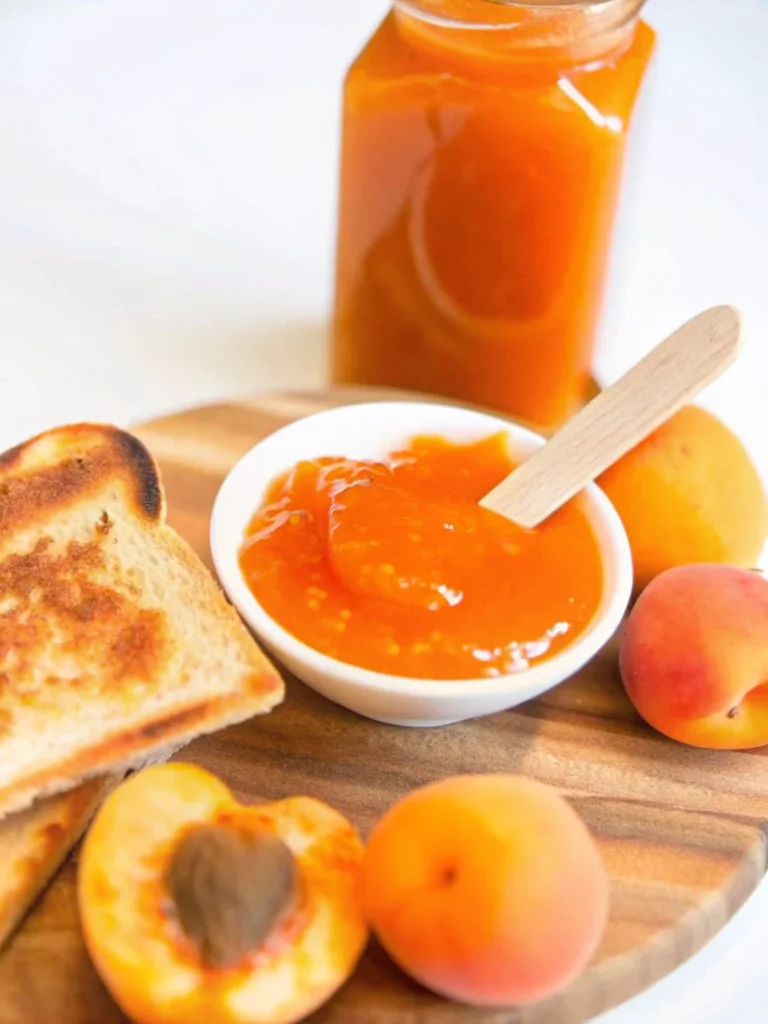
Nutritional Information
Your homemade apricot jam is more than just delicious – it’s nutritionally impressive:
Per 2-tablespoon serving:
- Calories: 68 kcal
- Carbohydrates: 17g
- Protein: 1g
- Fat: 0.2g (almost fat-free!)
- Fiber: 1g
- Sugar: 16g
- Potassium: 109mg
- Vitamin A: 801 IU – excellent for promoting eye health
- Vitamin C: 5mg – antioxidants like vitamin C are known for their skin-boosting properties and can help protect skin cells from UV radiation
Health Bonus: Thanks to their high amount of vitamins, flavonoids, and potassium, apricots have significant health benefits, with flavonoids working to protect and strengthen blood vessels while reducing signs of inflammation.
Healthier Alternatives for the Recipe
Transform your apricot jam into an even healthier treat:
Sugar Reduction Strategies:
- Reduce sugar by 25% and add natural fruit pectin for setting
- Sugar-free apricot jam alternatives are suitable healthy breakfast options leading to improved glycaemic and subjective appetite responses
- Try date sugar or coconut sugar for added minerals and complex flavors
Nutrient Boosting Options:
- Add chia seeds for omega-3 fatty acids and extra fiber
- Include fresh ginger for anti-inflammatory properties
- Stir in vanilla extract for antioxidant benefits without added calories
Dietary Adaptations:
- For diabetics: Apricots have a low glycemic index, which means that they increase blood glucose levels slowly, making them a good fruit option for diabetics
- For weight management: Fresh apricots are low in calories, containing only 57 calories per 100g of fruit, and are rich in fiber, which can keep you full and reduce over-eating
Serving Suggestions
Elevate your apricot jam experience with these creative serving ideas:
Morning Delights:
- Top French toast with apricot compote for a gourmet breakfast
- Swirl into Greek yogurt with toasted almonds for protein-packed perfection
- Spread on warm, buttery croissants for a Parisian café experience
Savory Applications:
- Combine fresh apricot jam with red pepper flakes for a spicy-sweet sauce over chicken
- Drizzle apricot glaze onto baked ham for holiday entertaining
- Create glazes for roasted vegetables or grilled meats
Dessert Inspirations:
- Layer between cake rounds for elegant tortes
- Use as filling for thumbprint cookies or linzer tarts
- Use in recipes for ice cream, cakes, sauces, and mousses
Common Mistakes to Avoid
Master the art of apricot jam by avoiding these frequent pitfalls:
Fruit Selection Errors:
- Do not use apricots that are over-ripe, soft or bruised as they may cause the jam to spoil
- Avoid mixing different ripeness levels without understanding their impact on texture
Cooking Catastrophes:
- Never rush the maceration process – patience rewards you with superior flavor
- Avoid high heat throughout cooking, which can cause burning and bitter flavors
- Don’t skip the stirring – stir constantly to prevent burn/scorching
Setting Struggles:
- Apricots have a medium pectin content and low acidity, so lemon juice is essential to boost both acidity and pectin content for proper setting
- Test jam consistency properly – rushing this step leads to runny results
Storage Slip-ups:
- Never seal jars while jam is too hot, which can create false seals
- Avoid storing in unsuitable containers that might affect flavor
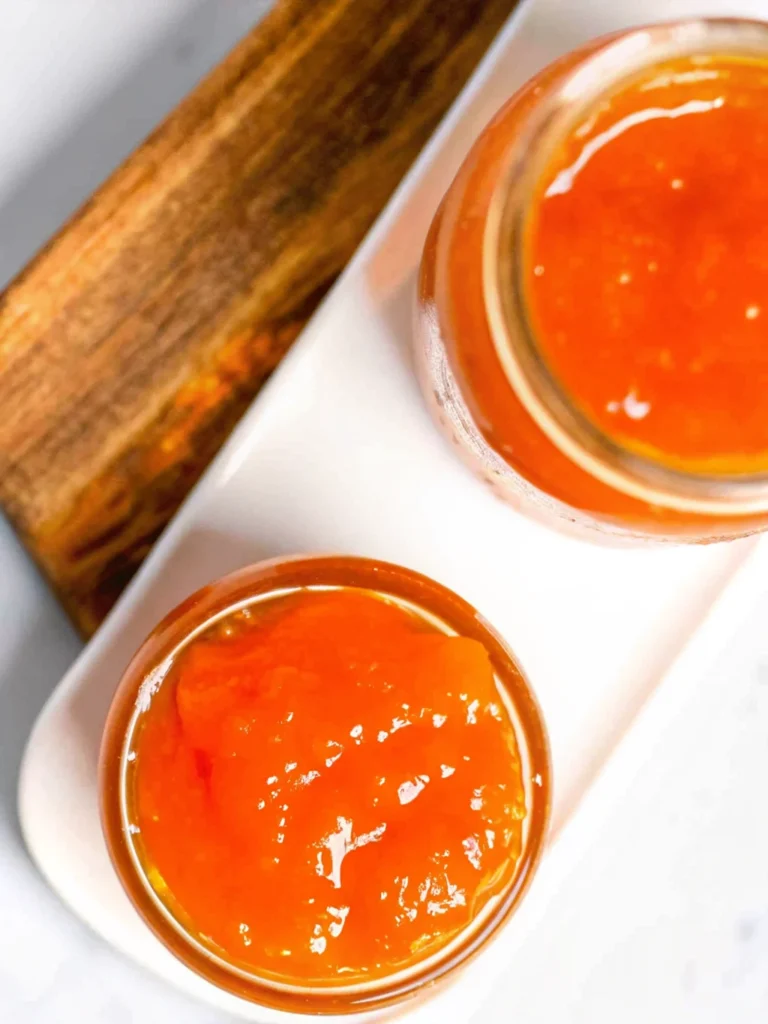
Storing Tips for the Recipe
Maximize your apricot jam’s lifespan and quality:
Short-term Storage:
- After opening, store apricot preserves in the refrigerator and consume within 6-12 months for optimal quality
- Keep refrigerated jam covered tightly and use clean utensils to prevent contamination
Long-term Preservation:
- Apricot preserves can last for 1-2 years unopened when stored in a cool, dark place. Once opened, they should be refrigerated and used within 6-12 months for the best quality
- For room temperature storage beyond one year, follow USDA canning guidelines with proper water bath processing
Freezer Storage:
- Freeze jars for up to six months in freezer-safe containers
- Leave extra headspace for expansion during freezing
- Thaw gradually in refrigerator for best texture retention
Quality Preservation Tips:
- Exposure to light and heat can compromise quality, so keep away from these factors
- Use clean utensils to prevent introducing bacteria that could spoil the preserves
- Consider using wax paper between preserves and the lid to help absorb moisture and keep preserves fresher
Conclusion
Creating professional-quality apricot jam at home combines simple techniques with time-honored traditions. This recipe transforms fresh apricots into golden, flavorful preserves through careful maceration, gentle cooking, and proper preservation methods. The result: a nutritious, additive-free apricot jam that captures summer’s essence year-round.
Ready to taste the difference homemade makes? Try this apricot jam recipe and share your delicious results in our review section below. Don’t forget to leave a comment about your favorite serving suggestions, and subscribe for more seasonal preserving recipes that bring professional quality to your home kitchen!
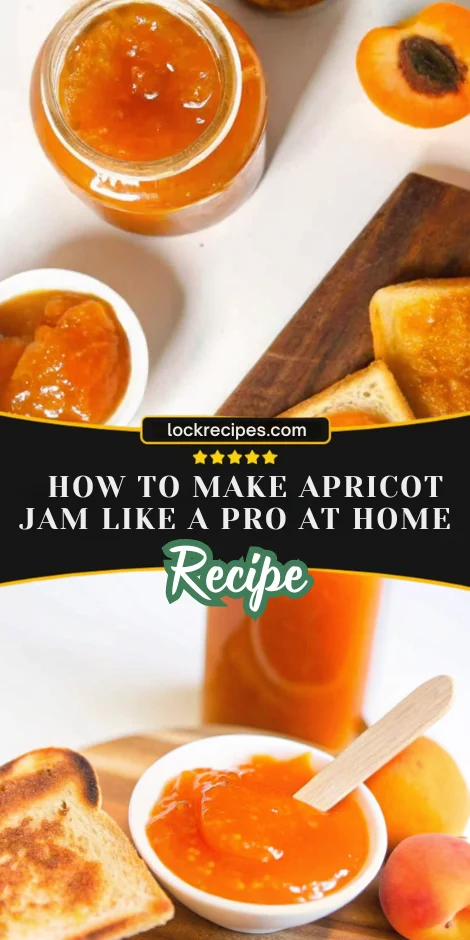
FAQs
Q: Can I make apricot jam without the overnight maceration step?
A: While possible, the extra maceration step ensures that your jam is full of apricot flavor, and skipping it isn’t recommended for optimal taste and texture.
Q: How do I know when my apricot jam is properly set?
A: Drop some syrup on a chilled plate, leave for 1 minute, then tilt the plate. If the jam doesn’t spread and holds its shape, it’s ready. If it’s still spreading, continue simmering and check every 5 minutes.
Q: Can I use slightly unripe apricots for jam-making?
A: Yes! Fruit that is just ripe, including some that are slightly unripe, will form a jam more easily as it is more acidic and contains more pectin which helps it set.
Q: Why is lemon juice essential in apricot jam?
A: Apricots have medium pectin content and low acidity, so lemon juice boosts both acidity and pectin content, helping the jam set properly while adding natural preservation qualities.
Q: How long will my homemade apricot jam last?
A: When stored correctly, preserves can remain good for 6-12 months in the refrigerator after opening, or 1-2 years unopened when stored in a cool, dark place.
Q: What are the health benefits of homemade apricot jam?
A: Thanks to high amounts of vitamins, flavonoids, and potassium, apricots provide significant health benefits including antioxidant action from vitamins A, C, and E, helping prevent chronic diseases while promoting eye, heart and brain health.
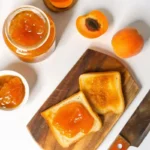
How to Make Apricot Jam Like a Pro at Home
- Total Time: 90 minutes active time
- Yield: 3 jars (250ml each) 1x
- Diet: Vegetarian
Description
This professional-style apricot jam recipe uses the traditional maceration technique to enhance flavor, prevent crystallization, and deliver a golden, preservative-free jam that captures summer’s essence. Packed with vitamins and antioxidants, it’s healthier, fresher, and more delicious than store-bought.
Ingredients
- 2.2 pounds (1 kg) fresh apricots – ripe but firm
- 1½ cups granulated sugar
- 2 tablespoons fresh lemon juice
- Optional: coconut sugar or date sugar for substitutions
- Optional: cinnamon, clove, cardamom, or vanilla for extra flavor
- Optional: a few apricot kernels for almond notes
Instructions
- Sterilize jars and lids by boiling for 8 minutes or roasting in oven at 160-180°C for 15 minutes. Let air-dry.
- Wash apricots, cut in half, and remove stones. Place in bowl with sugar and lemon juice. Mix gently.
- Allow mixture to macerate for 4 hours or overnight in refrigerator.
- Transfer mixture to a wide, heavy-bottomed pan. Cook on medium heat, stirring occasionally.
- When apricots soften, mash with potato masher for chunky jam or blend for smooth consistency. Continue cooking on low heat until thickened.
- Test jam by dropping syrup on a plate. If it doesn’t spread after 1 minute, it’s ready.
- Ladle hot jam into sterilized jars, leaving ½ inch headspace. Seal tightly and invert jars, or process in hot water bath for 5 minutes.
Notes
Maceration improves flavor and prevents crystallization. Use lemon juice to ensure proper set and natural preservation. Makes approximately 3 jars of golden apricot jam.
- Prep Time: 20 minutes (plus 4 hours or overnight maceration)
- Cook Time: 45-60 minutes
- Category: Preserves
- Method: Stovetop
- Cuisine: International
Nutrition
- Serving Size: 2 tablespoons
- Calories: 68
- Sugar: 16g
- Sodium: 1mg
- Fat: 0.2g
- Saturated Fat: 0g
- Unsaturated Fat: 0.2g
- Trans Fat: 0g
- Carbohydrates: 17g
- Fiber: 1g
- Protein: 1g
- Cholesterol: 0mg
